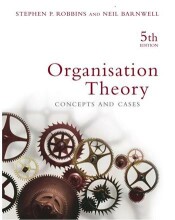Summary: Organizational Behaviour
- This + 400k other summaries
- A unique study and practice tool
- Never study anything twice again
- Get the grades you hope for
- 100% sure, 100% understanding
Read the summary and the most important questions on Organizational Behaviour
-
Workshop 1: Stereotypes, Prejudice and Discrimination
This is a preview. There are 3 more flashcards available for chapter 16/09/2015
Show more cards here -
What factors are needed for stereotype threats to have a negative effect on the performance of someone? (5 bullet points)
- A negative stereotype of group must exist
- The stereotype must be relevant to the situation
- The testing domain must be difficult enough for there to poor performance which could be perceived as stereotype confirming
- It is most harmful to the people identifying with the domain and consider it important to their self-worth
- Stereotype must be prevalent and widely known
-
Groups and Teams (L7)
This is a preview. There are 13 more flashcards available for chapter 20/10/2015
Show more cards here -
What are formal groups?
"Is defined by the organisation’s structure with designated work assignments establishing tasks" -
What are Command groups? (command groups fall under formal groups)
when the members of the group are led by the same leader -
Lecture 3: Diversity in organizations
This is a preview. There are 7 more flashcards available for chapter 18/09/2017
Show more cards here -
Which aspects do we take into consideration when evaluating people?
- Intellectual ability (measured in IQ tests)
- -
What are the 3 extensions of IQ?
- Emotional intelligence
- Cultural intelligence (how well can you adjust to a culture)
- Complex problem-solving -
What is informational diversity?
Underlying, less visible attributes e.g. educational background, skills, work experience, working styles. -
What is social diversity?
Mainly visible, easily detectable differences e.g. demographic diversity. -
What are the 4 methods of shaping behaviour?
- Positive reinforcement (providing a reward for desired behaviour (learning))
- Negative reinforcement (removing an unpleasant consequence when the desired behaviour occurs (learning))
- Punishment (Applying an undesirable condition to eliminate an undesirable behaviour (unlearning))
- Extinction (withholding... -
Workshop 1 - Stereotypes, prejudice and discrimination
This is a preview. There are 31 more flashcards available for chapter 19/09/2017
Show more cards here -
What is a heuristic value?
An internal voice/dialogue that provides information. e.g. if someone says I like leprechauns, you think he's from Ireland" -
When do we fall into automated brain processes?
When we lack time or energy to make deliberate or controlled judgements. For example wen we are:
- Pressed for time
- Preoccupied
- Tired
- Emotionally aroused.
- Higher grades + faster learning
- Never study anything twice
- 100% sure, 100% understanding

































